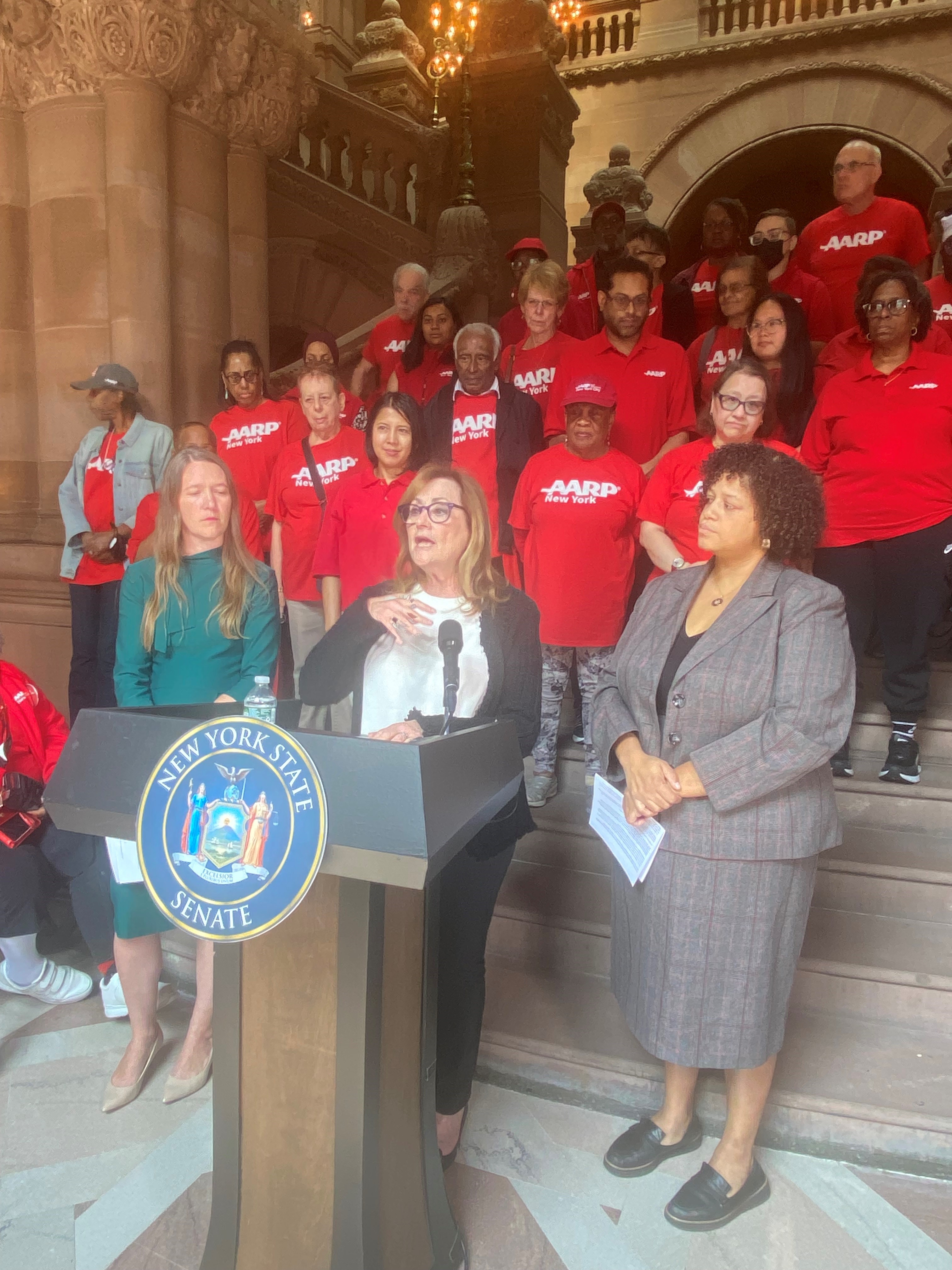AARP Hearing Center
1.1 M New York Households Missing Out on Help to Pay Utility Bills; ‘Benefits Matching’ Would Solve Problem

AARP NY, PULP, Legislative Sponsors Urge Enactment of Bill to Automatically Enroll Eligible NY Households in Utilities’ Energy Assistance Programs
ALBANY, N.Y. – About 1.1 million New York households are missing out on help to pay their utility bills, and AARP New York and the Public Utility Law Project (PULP) today stood with the sponsors of state legislation to require the use of “benefits matching” to ensure eligible utility customers get the help for which they qualify.
AARP, PULP and bill sponsor Assembly Member Michaelle Solages called for passage of the measure before the scheduled June 8 end of this year’s state legislative session.
The economic effects of the pandemic and inflation are taking their toll on New Yorkers, especially low-income households and older residents living on fixed incomes. Costs continue to rise, and New Yorkers continue struggling to pay for basic needs, including rent, food and utilities.
About 1.2 million New York households are behind on their utility bills by a combined $1.7 billion.
New Yorkers who receive federal Home Energy Assistance Program (HEAP) grants - which are paid directly to their utility on the customer’s behalf - are automatically enrolled in their gas and electric utility company’s own Energy Assistance Programs (EAP), which require the companies to keep customers’ energy burden at or below 6% of household income.
However, many low-income utility customers are not enrolled in HEAP, and they must enroll in EAP programs on their own. That has led to about 1.1 million households in New York – an estimated 2.6 million people – who are eligible for the EAP program not being enrolled.
Bill S4548-Parker/A4876-Solages, also sponsored by Senate Energy & Telecommunications Committee Chair Kevin Parker, would require the state Office of Temporary and Disability Assistance to generate lists of beneficiaries of OTDA-administered programs who are also eligible for utility companies’ affordability programs and share that data with the utilities. New York City already matches benefits data in this way. The state legislation would standardize this process statewide, with all utilities participating.
“This is a straightforward fix that would help over a million low-income New York households pay their utility bills,” said AARP New York State Director Beth Finkel. “There’s really no good reason not to pass this bill, especially since New York City is already successfully conducting this sensible benefits matching. Ultimately, the State should apply this concept to more benefits programs. Enacting the Parker-Solages bill into law would be a great first step.”
“The EAP’s monthly discount is tremendously helpful to those low-income households already enrolled in their electric or gas utility company’s program,” said PULP Executive Director Laurie Wheelock. “New York State has the opportunity to implement a broad, automatic benefit matching program that could help up to a million-plus households save on their energy costs every month. PULP thanks Senator Parker and Assemblymember Solages for their steadfast leadership to protect the state’s financially vulnerable this legislative session.”
“Rising utility costs are creating hardship for families across our state,” said Assembly Member Michaelle Solages, Chair of the Black, Puerto Rican, Hispanic & Asian Legislative Caucus. “Many of these same families receive public assistance but do not receive home energy assistance simply because they did not fill out additional paperwork. By leveraging technology and shared data, this bill will ensure that low-income individuals are automatically enrolled in HEAP, which will save countless New Yorkers money on utility bills.”
The EAP offers customers a monthly bill credit using a tiered-discount structure.
New York City’s Human Resources Administration matches data of customers who participate in the Supplemental Nutrition Assistance Program (food stamps), public assistance, Supplemental Security Income and the Low-Income Home Energy Assistance Program.
“It is essential that utility customers throughout the state are connected to any and all assistance programs for which they are eligible,” the legislative sponsors say in their bill memo. “An automated process is … more efficient and less costly to administer” than individually identifying qualifying customers. “Making file matching a statewide practice is a more efficient utilization of state and utility resources.”
Contacts: Erik Kriss, ekriss@aarp.org, and Christopher Carola, ccarola@aarp.org
Follow AARP NY on Twitter: @AARPNY and Facebook: AARP New York
About AARP
AARP is the nation’s largest nonprofit, nonpartisan organization dedicated to empowering people 50 and older to choose how they live as they age. With a nationwide presence and nearly 38 million members, AARP strengthens communities and advocates for what matters most to families: health security, financial stability and personal fulfillment. AARP also produces the nation's largest circulation publications: AARP The Magazine and AARP Bulletin. To learn more, visit www.aarp.org, www.aarp.org/espanol or follow @AARP, @AARPenEspanol and @AARPadvocates, @AliadosAdelante on social media.
###

































































